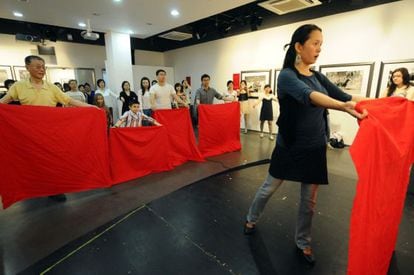Don Quixote tilts at China
The Cervantes Institute is downsizing its premises in Shanghai The Spanish language is failing to attract the number of students that was expected

"Spain is the best gateway to Latin America, and Spanish is the key that opens it." This is the mantra that gets repeated over and over at all cultural and business events organized by Spanish government agencies in China.
But somehow the message does not seem to be getting through. In fact, Spanish Education, Culture and Sports Minister José Ignacio Wert had to personally fly to Beijing in late October to try to increase the presence of Chinese exchange students. Even though the Asian giant is the world's greatest emitter of students - 400,000 no less - fewer than 6,000 choose Spain as their destination.
Reality is obstinate, and the economic crisis rules. Next year, this truth will be mostly felt in Shanghai, the wealthiest, most populated metropolis in all of China, with 24 million inhabitants. Thursday of this week was to be the last working day for the cultural manager of the local Miguel de Cervantes Library, a department that answers to the Spanish Consulate in Shanghai and functions as an unofficial branch of the Cervantes Institute, the Spanish equivalent of the British Institute.
Her departure means that Spanish cultural activities in China's economic capital will be reduced to a bare minimum.
If there is a strategy for selling Spanish culture, nobody has noticed it"
"There is a clear commitment to China, because it is a country with great potential. But the current budgets are not the ones we had a few years ago," says Inma González Puy, director of the Cervantes Institute in China. "And the crisis is affecting all the centers in the network. Cultural programming will adapt to that, as it will in Beijing. Now we are seeking to finance it through cooperation with other institutions, and for instance many Latin American consulates are willing to work with us.
"But it is undeniable that the current situation is not what we had when we started working here in 2006. In Shanghai, library activities will continue and we will share the auditorium, but there is no good reason to maintain a set of rooms that are barely used," she adds.
An estimated 25,000 Chinese citizens are learning Spanish, 4,500 of them at the Cervantes Institute. But the Spanish cultural and language institution only has permission to operate in Beijing. Despite repeated requests during official visits at the highest levels, China has always refused to extend the necessary licenses to teach Spanish in Shanghai. Then again, the Alliance Française and the Goethe-Institut have fared no better. That is why Spanish lessons there will be taught in partnership with a Chinese associate who will take care of the facilities at no extra cost for the Spanish authorities.
"This is a new form of the Cervantes for certain locations where it cannot function autonomously," notes Puy. "We've been doing it for several months and it is working well."
But Hu Yuan thinks otherwise. Four months ago he took the required test to determine his proficiency in Spanish, and paid 2,850 yuan (350 euros), the lowest price on offer, for 60 hours of Spanish at level B 1.1.
"We should have started classes on November 4, but even the minimum enrollment of seven students was not met, and we've been waiting for a month. Some people have demanded their money back," he explains. Finally, his course began this week, nearly five weeks late. "If I wanted to enroll in French, German, even Russian, I wouldn't have this kind of trouble. Spain projects a bad image this way."
This view is shared by many Spaniards who live in China. "Spain goes to great lengths to import wine, cheese, ham and olive oil, but when it comes to culture and design there is a greater interest in promoting them among Spaniards working in China than among government agencies," says Roberto Gamero, art director at the headquarters of an important Shanghai-based multinational that promotes broadcasting projects.
"The problem is that if there really is a strategy for cultural promotion, nobody has noticed it," adds Julen Asua, an architect at a Chinese studio who says the Chinese collective imagination is still prey to the stereotypes about soccer, bullfighting and flamenco. "Spain does not seem to understand that one needs a strong image as a cultural power in order to sell cured meats too," says a businessman who is associated with the Spanish Chamber of Commerce in China and who spoke on condition of anonymity. "The dismantling of the Cervantes in this city is just further evidence of how Spain is turning its back on China."










































